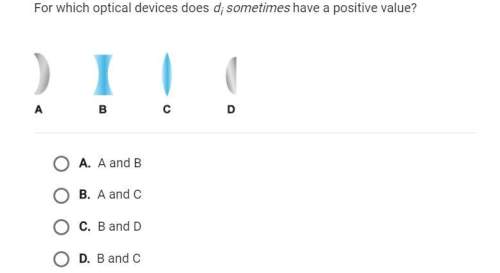
Physics, 29.11.2020 22:10 BabyRage4900
A car is traveling 60 km/h and accelerates at a rate of 4 m/s^2 how long does it take the car to get to 90 km/h? ( please show work)

Answers: 1
Another question on Physics

Physics, 21.06.2019 22:00
Air is held within a frictionless piston-cylinder container, which is oriented vertically. the mass of the piston is 0.45 kg and the cross-sectional area is 0.0030 m2. initially (state 1) the pressure of the gas is sufficient to support the weight of the piston as well as the force exerted by the atmospheric pressure ( 101.32 kpa). the volume occupied by the air within the cylinder in state 1 is 1.00 liter. one end of a spring (with spring constant k = 1000 n/m) is attached to the top of the piston, while the other end of the spring is attached to a stage that can move vertically. initially the spring is undeflected and therefore exerts no force. then the stage is then moved quasistatically downward a distance of 10.0 cm, at which point the system reaches state 2. the piston-cylinder is not insulated; rather it remains in diathermal contact with the surroundings, which are at a constant temperature of 300 k. what is the change of pressure within the container?
Answers: 3

Physics, 23.06.2019 00:40
Researchers conducted an experiment to identify the effects of three different hand sanitizers on the growth of bacteria. the researchers grew one type of bacteria in twenty-four identical covered petri dishes. then, they opened eighteen petri dishes and applied the three hand sanitizers to six petri dishes each. they left the remaining six petri dishes closed as a control group. when the researchers measured the growth of bacteria two days later, the six dishes that had no hand sanitizer showed the least amount of bacterial growth. the researchers concluded that not using any hand sanitizer would lead to the least bacterial growth. which statement best explains why the researchers’ conclusion was not justified? the experiment tested too many variables. the control group was not treated the same as the experimental group. the sample size of twenty-four petri dishes is not large enough. the single type of bacteria is not adequate to make any conclusions.
Answers: 1

Physics, 23.06.2019 04:50
Which is not true of alpha radiation? o a. it increases the number of protons. o b. it has a positive charge. o c. it causes transmutation. o d. it is heaviest of the three types
Answers: 1

Physics, 23.06.2019 07:30
Based on the image below what would an observer on the nighttime side of earth observe?
Answers: 1
You know the right answer?
A car is traveling 60 km/h and accelerates at a rate of 4 m/s^2 how long does it take the car to get...
Questions



Computers and Technology, 02.02.2021 17:20

Mathematics, 02.02.2021 17:20


Mathematics, 02.02.2021 17:20

Mathematics, 02.02.2021 17:20




Geography, 02.02.2021 17:20


English, 02.02.2021 17:20

Mathematics, 02.02.2021 17:20

Mathematics, 02.02.2021 17:20

History, 02.02.2021 17:20

Biology, 02.02.2021 17:20

Mathematics, 02.02.2021 17:20





